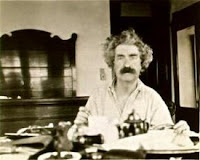 Mark Twain, due to financial problems, undertook a world tour in 1895. The tour began in America, and after an initial stop in Cleveland, proceeded to Minnesota, by way of the upper peninsula of Michigan.
Mark Twain, due to financial problems, undertook a world tour in 1895. The tour began in America, and after an initial stop in Cleveland, proceeded to Minnesota, by way of the upper peninsula of Michigan.It was not easy for lecture-hall and opera-house audiences of the nineteenth century, conditioned to expect formal and usually oratorical lectures, to become accustomed to the Mark Twain manner. Frequently, Twain walked nonchalantly onto the stage, hands in pockets, as if he had wandered in from the street and appeared surprised to find himself facing an audience. Unlike the loud, haranguing, even hell-fire-and-brimstone voice of the average circuit speaker, Twain's voice was quiet. He spoke slowly, in a drawl described abroad as "Yankee." He did not hide himself behind the lectern but strolled about the stage from time to time. Though he had his talk memorized, he delivered it as if it were coming to him on the spot. It took an audience a while to become attuned to this peculiar sort of lecture. Perhaps in fear of misunderstanding among audiences, Major Pond was reluctant to call Twain's performances lectures. A Winnipeg advertisement promised "Two 90-Minutes Chat and Character Sketches;" advertising in most American towns called them simply "talks," and the Australian manager Smythe advertised them as "At Homes," hoping, no doubt, to prepare audiences for Twain's informal delivery.
From a July 30, 1895 Grand Forks Herald interview, Twain had this to say about the Red River Valley: "This country of yours out here astonished me beyond all imagination. Never in my life have I seen such fields of grain extending in all directions to the horizon. This country appears to me to be as it were a mighty ocean; my conception of it is the same as that of a man who has never seen the ocean before, he sees nothing but water as far as the eye can reach; here I see nothing but oceans of wheat fields. Why, it is simply miraculous."
From the July 26, 1895 Crookston Daily Times: "The people along the Fosston line have caught the contagion, and are not to be outdone by the towns on the St. Vincent line who secured a special train to take their people home after the performance. The Fosston people have also arranged for an excursion rate and for transportation home after the performance. Through the courtesy of Supt. Jenks, the Fosston Flyer, which leaves here at 6 o'clock will be held until 11 o'clock Monday evening. This insures a large attendance from Fosston way, and already telegrams are pouring in for seats. There is now no question that the opera house will be packed with the largest and best audience ever assembled in Crookston."
Although the entire program presented in Crookston's Grand Opera House is not known, the Polk County Journal reported that Twain, after doing six unnamed selections, "announced that he would give a few extracts from the 'Diary of Adam,' something new to this audience, and which in our opinion is the drollest of all his writings. This kept the audience in a continual uproar from start to finish and put them in excellent humor for 'The Golden Arm,' which wound up the entertainment."
When the lecture concluded at 10:30 P.M.. Twain reportedly was so pleased with his audience — all those people from miles away, from towns along the St. Vincent and Fosston lines of the Great Northern, including such places as Hallock, Warren, Mcintosh, and Mentor — that he "...stepped down off the stage and was introduced to all who desired to grasp him by the hand."
- From Mark Twain in the Red River Valley of the North, by Norton D. Kinghorn [This article is based on a speech Mr. Kinghorn gave in 1975; at that time, he was an associate professor of English at the University of North Dakota, Grand Forks...]
NOTE:
This post came about thanks to William Ash, who wrote me to say, "...I thought this article from the Minnesota Historical Society would really interest you. It appears that the writer Mark Twain or Samuel L. Clemens was in the Red River Valley of the North in July 1895. He was in or gave speeches in Grand Forks, ND, Winnipeg, MB and Crookston, MN among many other towns and cities on his world wide speaking tour.
It appears that he was traveling by train in July 1895 and if he didn't travel thru St. Vincent, MN ( the article doesn't really say if he was in St. Vincent, MN or ever got off the train in St. Vincent, MN) but I think it is very probable that he traveled very close to St. Vincent, MN or thru St. Vincent, MN on his travels from Winnipeg, MB to Crookston, MN since you now as well as I do where the Great Northern Railroad or even the Northern Pacific Railroad tracks were..."
At the rate he is going on story suggestions/submissions, I'll have to make him a staff member here soon! Thanks, Bill!
No comments:
Post a Comment